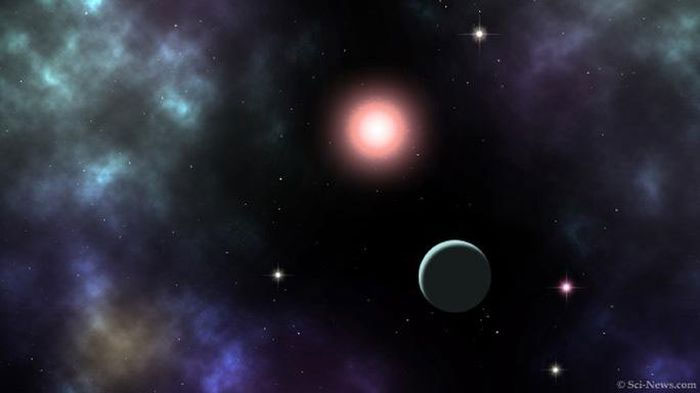Discover a new planet, easy to live like... Europe?
A new planet in the form of Little Neptune could have a cool temperate climate and liquid water - the potential for life.
Using data from NASA's "exoplanet hunter" TESS and several ground-based telescopes, the aging team led by Dr. Akihiko Fukui from the University of Tokyo and the Canarias Institute of Astronomy has found a system A nova named TOI-2285 , possesses a small gaseous planet with a cool climate.

Graphic image depicting a red dwarf star and its temperate planet - (Image: SCI-NEWS)
According to Dr. Fukui, previously, the Kepler space mission has revealed this type of planet to be abundant in other star systems. Often referred to as "Little Neptune" , it is located between Earth and Neptune and is a gaseous planet.
According to Sci-News, Little Neptune has two forms, one is a group of hot and small planets located too close to the parent star, and a cooler and slightly larger form. The new planet belongs to the second type. Although it seems to be a bit outside the "habitable zone" , it is home to rocky planets like Earth, Mars or Venus and has a moderate distance from the parent star. But the existence of this boundary, combined with its own characteristics, suggests that this small Neptune may have water.
The new planet, called TOI-2285b , orbits its parent star every 27.3 days and receives 1.54 times more light from its parent star - a red dwarf - than Earth receives from the Sun. It has a radius of 1.74 times that of Earth but a mass 19.5 times less than that of Earth, because a gaseous planet usually has the thickest layer, a cloudy sky, so it is very light.
Astronomers believe that a layer of water exists under the planet's hydrogen-rich atmosphere, and that its outermost rocky surface may also contain liquid water. In addition, is a climate similar to the temperate zone. There will be many more research steps to be taken before determining whether the planet is really habitable and habitable, but considering what happens in the solar system, it is an optimistic possibility.
The study has just been published in the Publications of the Astronomical Society of Japan.
- Discover a human planet that can live
- Windows Live Planet: Microsoft's new social network
- Stephen Hawking: People will live on another planet for the next 100 years
- Discover the oldest well in Europe
- Discover the giant planet with weird orbits
- Europe prepares to probe Venus
- Crocodiles have migrated to live on Mars?
- Ross 128b - Planet 'twin' with Earth and things to know
- France discovered adding a new planet
- Discover a set of three planets that may have life
- Scientific research on the mission to discover Pluto
- Discover an earth-like planet that can have life
 Van Allen's belt and evidence that the Apollo 11 mission to the Moon was myth
Van Allen's belt and evidence that the Apollo 11 mission to the Moon was myth The levels of civilization in the universe (Kardashev scale)
The levels of civilization in the universe (Kardashev scale) Today Mars, the sun and the Earth are aligned
Today Mars, the sun and the Earth are aligned The Amazon owner announced a secret plan to build a space base for thousands of people
The Amazon owner announced a secret plan to build a space base for thousands of people